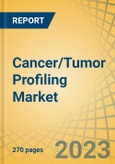Succeeding extensive secondary and primary research and in-depth analysis of the market scenario, the report comprises the analysis of key industry drivers, restraints, challenges, and opportunities. The growth of the cancer/tumor profiling market is attributed to the increasing prevalence of cancer, the rising pharmaceutical R&D expenditures, the growing number of targeted therapies and the discovery of new actionable biomarkers, increasing investments in cancer research, the declining costs of NGS-based profiling, and advancements in multi-omics tumor profiling. However, the high capital investments required for NGS setups and long turnaround times restrain the growth of this market.
Additionally, the increasing focus on developing personalized medicines and the rising awareness and adoption of targeted therapies are expected to generate market growth opportunities. However, the lack of genetic experts for interpreting results, the non-availability of in-house tumor profiling technologies, and the high number of false biomarker discoveries are major challenges for the stakeholders in the cancer/tumor profiling market.
Based on biomarker type, in 2023, the genetic biomarkers segment is expected to account for the largest share of the market. The large market share of this segment is attributed to the effectiveness of genetic biomarkers as targets for therapeutic treatments, their role in enhancing treatment delivery, and their utility in facilitating convenient disease diagnosis.
Based on technology, in 2023, the next-generation sequencing (NGS) segment is expected to account for the largest share of the market. The large market share of the segment is attributed to the growing adoption of NGS in cancer/tumor profiling, its ability to provide faster and more accurate genetic testing, the rapidly declining cost of sequencing per base, and the introduction of cost-effective benchtop laboratory sequencers.
Based on cancer type, the cancer/tumor profiling market is segmented into breast cancer, colorectal cancer, lung cancer, prostate cancer, lymphoma, leukemia, cervical cancer, and other cancer types. In 2023, the breast cancer segment is expected to account for the largest share of the cancer/tumor profiling market. The increase in breast cancer cases, government initiatives promoting breast cancer treatment, increasing healthcare expenditure, and reimbursement for certain profiling technologies such as NGS have propelled the demand for cancer/tumor profiling for breast cancer.
Based on application, the research applications segment is expected to account for the largest share of the market. The large market share of this segment is attributed to the rising incidence of cancer, the growing demand for precision medicine, the increased discovery of biomarkers, and the availability of cost-effective advanced profiling technologies like NGS and PCR for research applications.
Based on end user, in 2023, the pharmaceutical & biopharmaceutical companies segment is expected to account for the largest share of the market. The large market share of this segment is attributed to the declining costs of sequencing, the development of companion diagnostics and precision medicine, and the high demand for cancer/tumor profiling from pharmaceutical and biopharmaceutical companies, primarily for biomarker discovery purposes.
An in-depth analysis of the geographical scenario of the global cancer/tumor profiling market provides detailed qualitative and quantitative insights about the five major geographies (North America, Europe, Asia-Pacific, Latin America, and the Middle East & Africa) along with the coverage of major countries in each region. In 2023, North America is expected to account for the largest share of the cancer/tumor profiling market, followed by Europe, Asia-Pacific, Latin America, and the Middle East & Africa. North America’s significant market share can be attributed to factors such as the rising burden of cancer, the presence of key market players, well-established healthcare infrastructure, and government initiatives aimed at bolstering cancer research efforts.
The key players operating in the global cancer/tumor profiling market are Thermo Fisher Scientific Inc. (U.S.), Illumina, Inc. (U.S.), QIAGEN N.V. (Netherlands), F. Hoffmann-La Roche Ltd. (Switzerland), Agilent Technologies, Inc. (U.S.), NanoString Technologies, Inc. (U.S.), HTG Molecular Diagnostics, Inc. (U.S.), Agendia Inc. (U.S.), Personalis, Inc. (U.S.), Exact Sciences Corporation (U.S.), and Tempus Labs, Inc. (U.S.).
Scope of the Report:
Cancer/Tumor Profiling Market Assessment - by Biomarker Type
- Protein Biomarkers
- Genetic Biomarkers
Cancer/Tumor Profiling Market Assessment - by Technology
- Next-Generation Sequencing (NGS)
- Polymerase Chain Reaction (PCR)
- In-situ hybridization (ISH)
- Immunohistochemistry (IHC)
- Other Technologies
Note: Other technologies include immunoassays, microarrays, mass spectrometers, Sanger sequencing, pyrosequencing, and fragment analysis
Cancer/Tumor Profiling Market Assessment - by Application
- Clinical Applications
- Research Applications
Cancer/Tumor Profiling Market Assessment - by Cancer Type
- Breast Cancer
- Colorectal Cancer
- Lung Cancer
- Prostate Cancer
- Lymphoma
- Leukemia
- Cervical Cancer
- Other Cancer Types
Note: Other cancer types include bladder cancer, melanoma, kidney cancer, stomach cancer, ovarian cancer, thyroid cancer, and head & neck cancers
Cancer/Tumor Profiling Market Assessment - by End User
- Pharmaceutical & Biopharmaceutical Companies
- Hospitals & Diagnostic Laboratories
- Academic & Research Institutes
- Contract Research Organizations (CROs)
Cancer/Tumor Profiling Market Assessment - by Geography
- North America
- U.S.
- Canada
- Europe
- Germany
- France
- Italy
- U.K.
- Spain
- Rest of Europe
- Asia-Pacific
- China
- Japan
- India
- Rest of Asia-Pacific
- Latin America
- Middle East & Africa
Table of Contents
Companies Mentioned
- Thermo Fisher Scientific Inc. (U.S.)
- Illumina Inc. (U.S.)
- QIAGEN N.V. (Netherlands)
- F. Hoffmann-La Roche Ltd. (Switzerland)
- Agilent Technologies Inc. (U.S.)
- NanoString Technologies Inc. (U.S.)
- HTG Molecular Diagnostics Inc. (U.S.)
- Agendia Inc. (U.S.)
- Personalis Inc. (U.S.)
- Exact Sciences Corporation (U.S.)
- Tempus Labs Inc. (U.S.)








